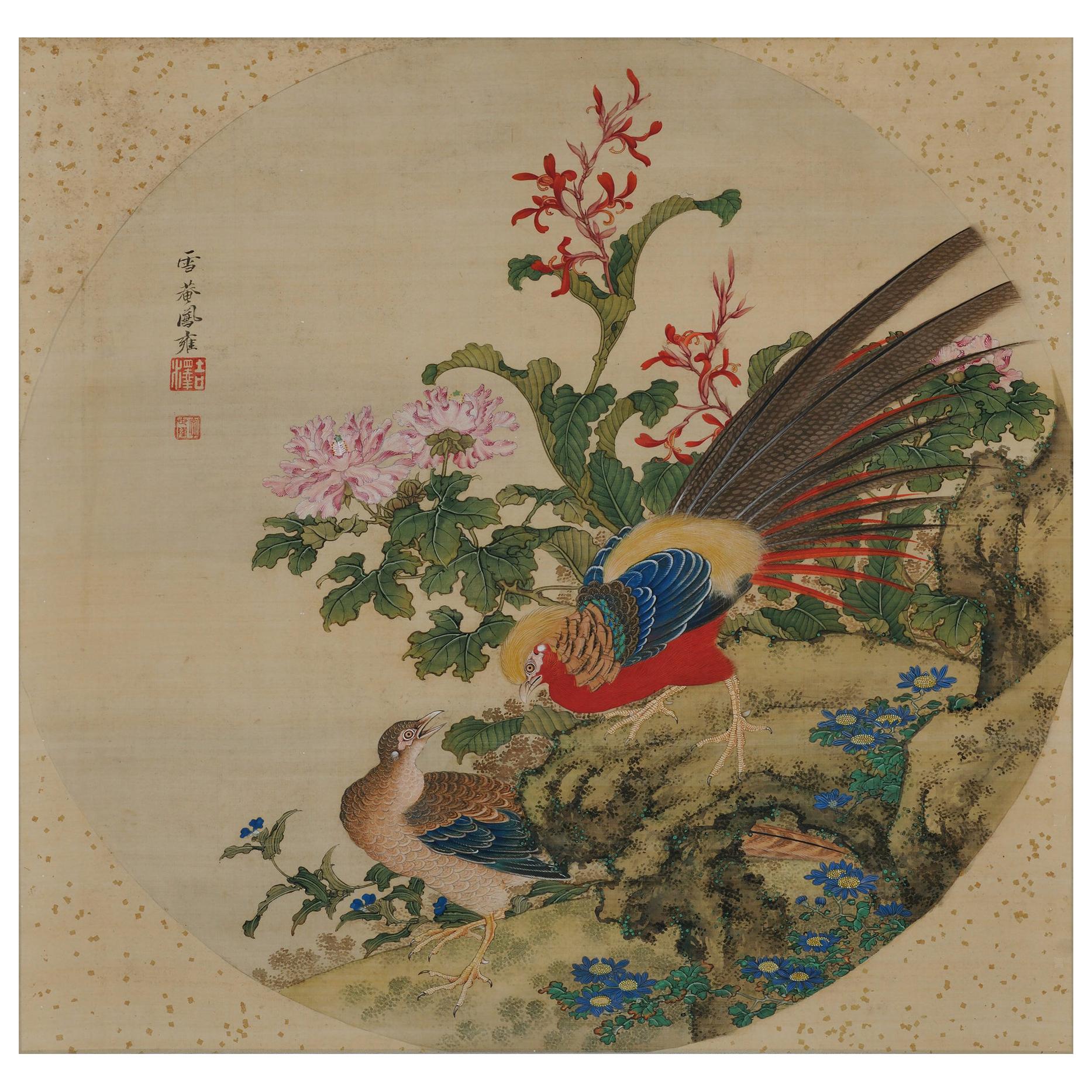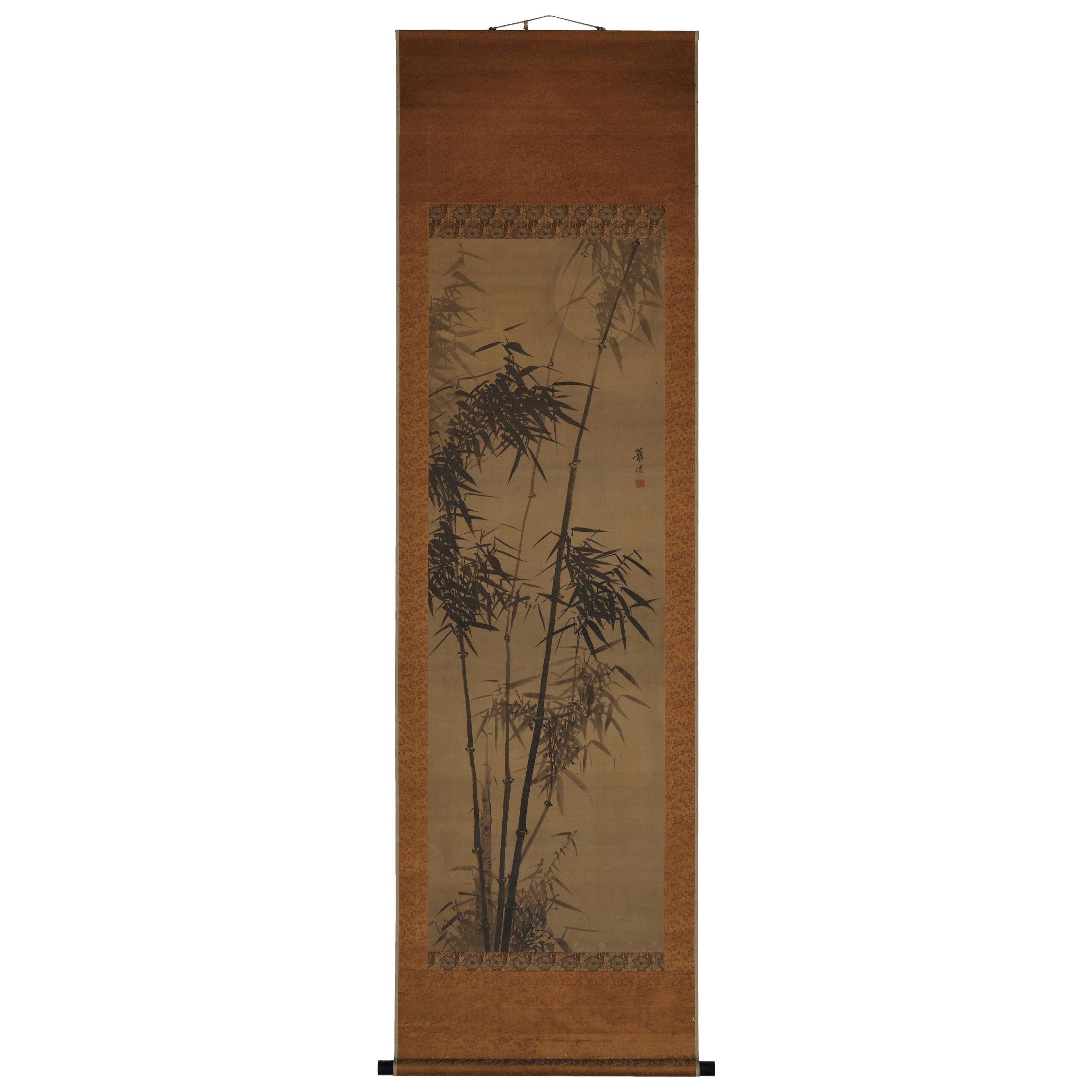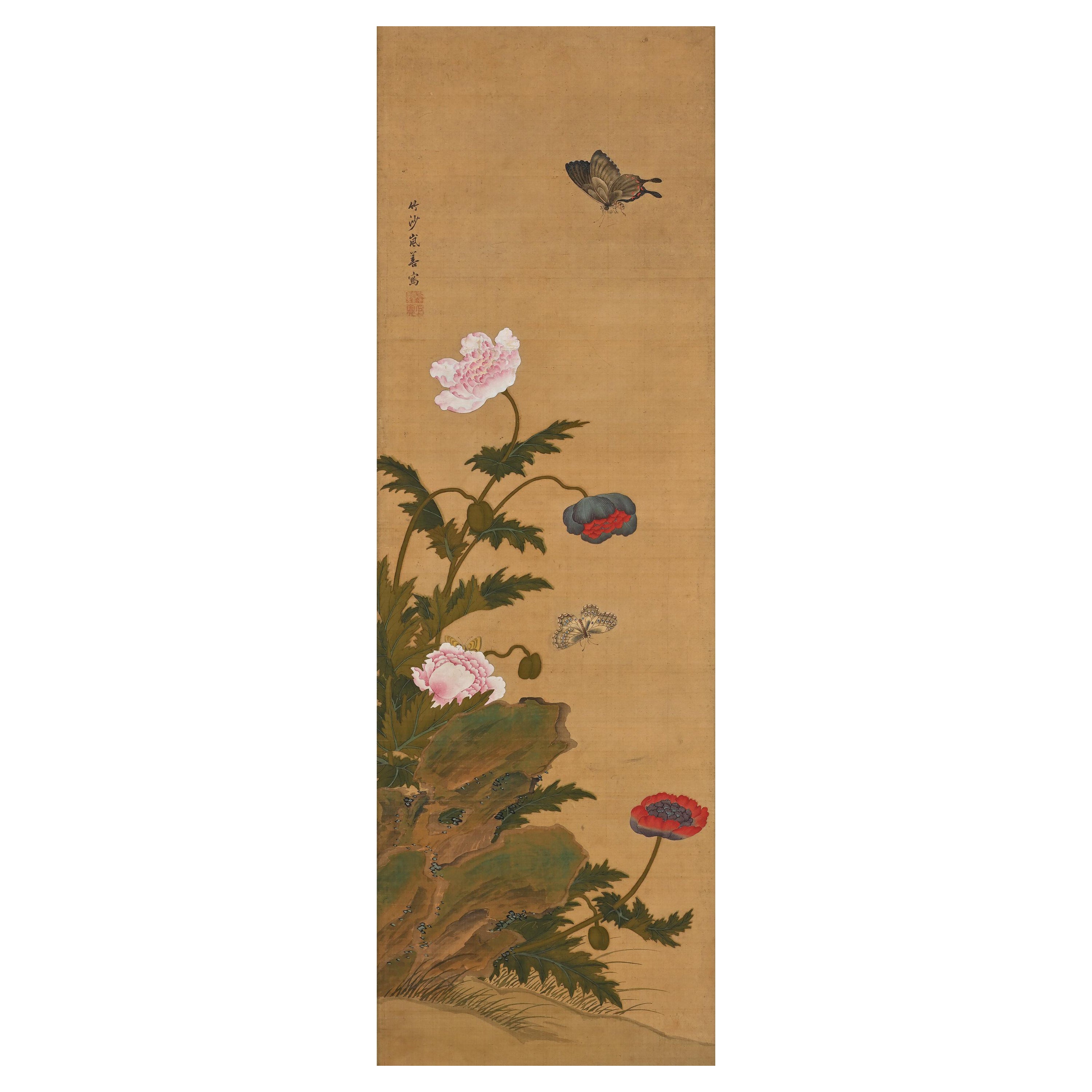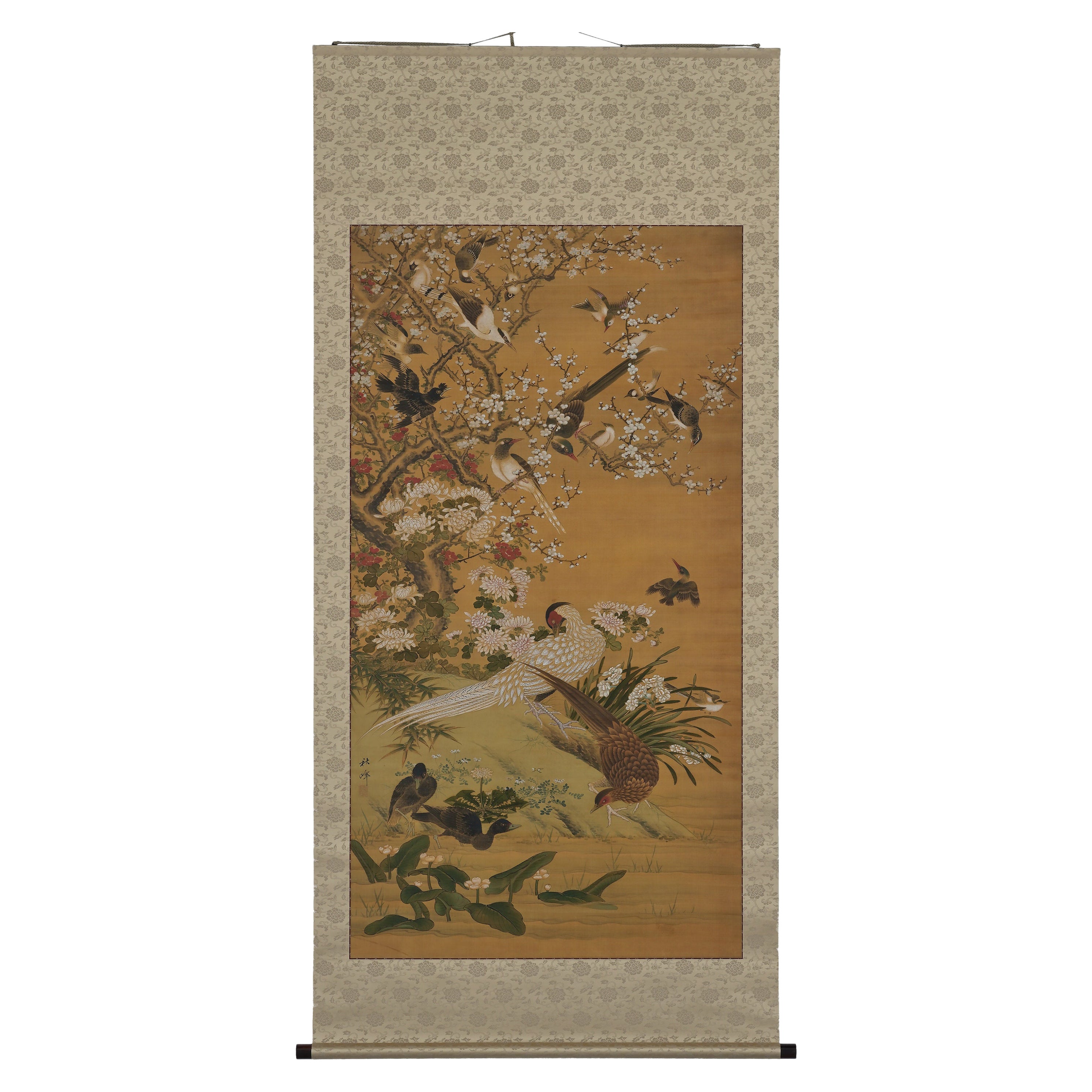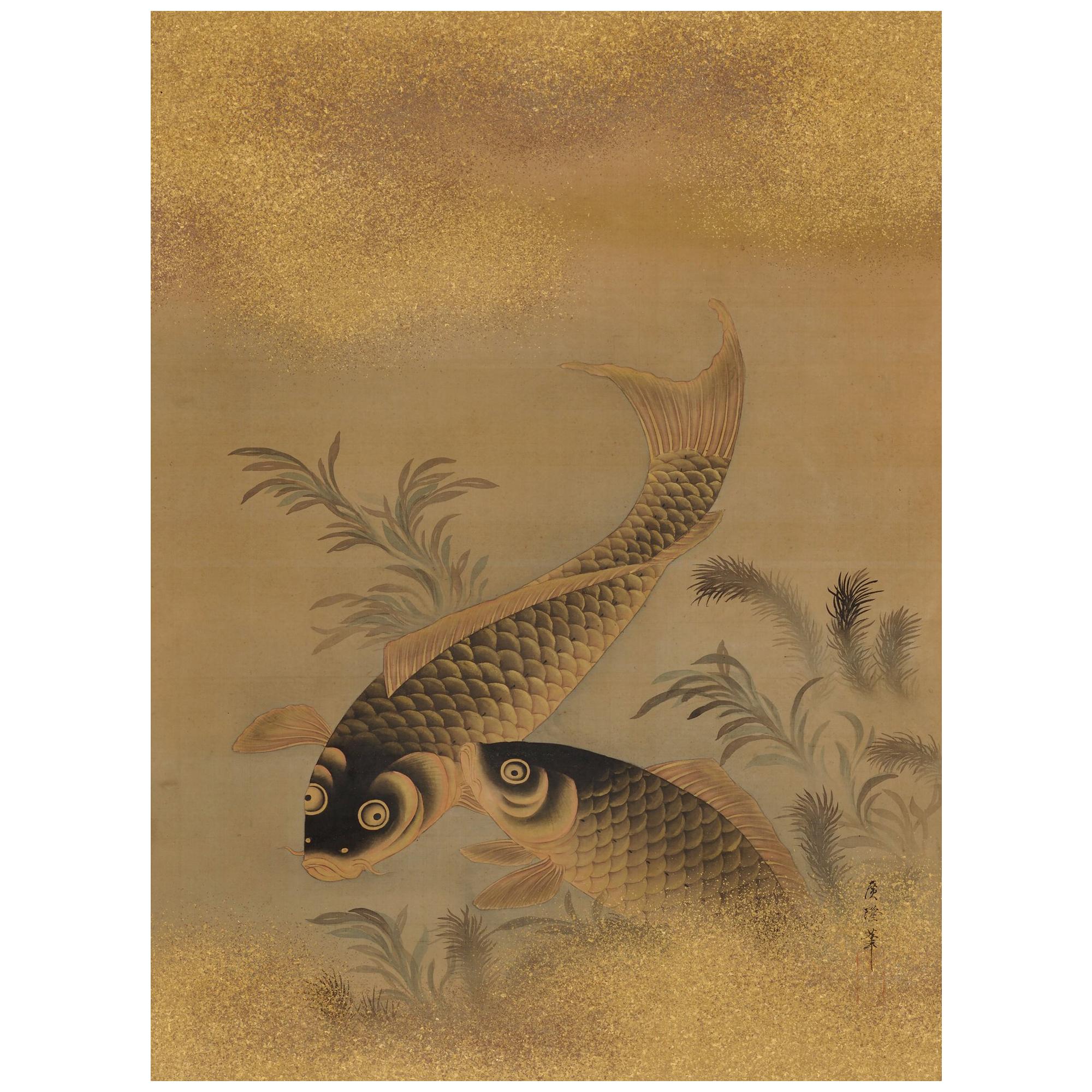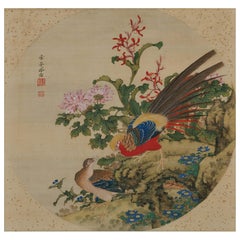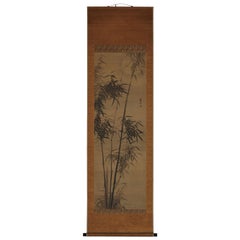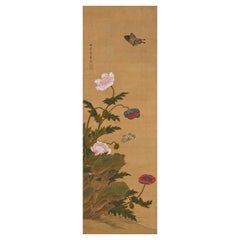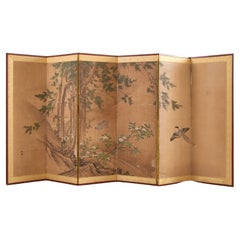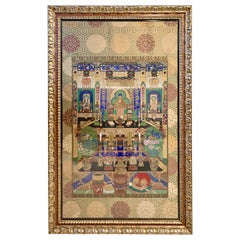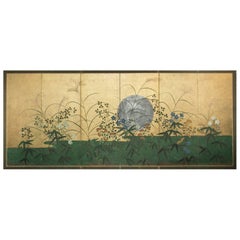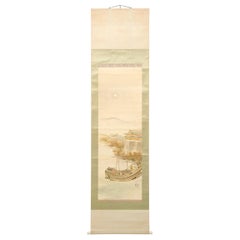Items Similar to 19th Century Japanese Shunga Hand-Scroll, Katsukawa School
Want more images or videos?
Request additional images or videos from the seller
1 of 16
19th Century Japanese Shunga Hand-Scroll, Katsukawa School
About the Item
Shunga
Unknown artist
Meiji era, circa 1880
Hand-scroll mounted with 12 paintings
Ink, pigment and gofun on silk
Dimensions:
Each image measures H. 23.2 cm x W. 34.4 cm (9.15” x 13.5”)
The hand-scroll measures H. 28 cm x W. 540 cm (11” x 212”)
A set of 12 late 19th century Japanese Shunga paintings mounted as a hand-scroll. Two of the leaves bear the signature and seal ‘Setsuzan’, although we are unable to confirm the identity of the artist using this art name. 6 of the 12 images are taken almost directly from Katsukawa Shuncho’s late 18th century woodblock series, ‘Erotic Pictures for the Twelve Months’. The poses of the protagonists and the lines of their robes are virtually identical. Elements of the backgrounds and the patterns of the kimono have been changed; the text has been removed and replaced with imagery. And this imagery references the original texts and seasons. For example, the eighth painting on this hand-scroll copies a very well known Shuncho woodblock print. There the text tells the story that the couple are enjoying an autumn moon viewing. In the present version the ladies’ undergarment is patterned with rabbits, which is an allusion to the moon and also sexuality. In the 9th painting of the present series, the text has been replaced with a pair of sliding door paintings. The painting shows an idyllic landscape which echoes with themes of solitude and quietude. The text describes a woman who has seduced a young man at the kabuki theatre. She has taken him to an adjacent teahouse during the half-time interval. The young man is worried that they will be heard downstairs, the woman is unconcerned.
In the present painted hand-scroll the colors and pigments are far richer than those used for Shuncho’s original woodblock prints. The scrolls’ vivid palette and lavish materials suggests that this work was made under special order. Such elaborately executed hand-scrolls often found at least nominal justification as accoutrements for a bride’s trousseau. The Katsukawa school of Ukiyo-e artists was particularly popular in the last decades of the 18th century. It’s influence had waned by the mid 19th century. Some 50 artists are known to have been directly connected with and trained by the school. Katsukawa Shuncho, who’s work is the direct inspiration for this set of 12 paintings, drew inspiration for his work from the Ukiyo-e artist Torii Kiyonaga. The painter of this set of paintings, using the name Setsuzan, remains a mystery. He was perhaps a minor artist associated with the very final stages of the Katsukawa school, or more likely an unaffiliated professional painter working on a specific commission during the Meiji period.
The paintings have recently been restored and remounted in Kyoto utilizing traditional techniques and craftsmen. The gold-flecked background paper and the silk front-piece are from the original hand-scroll and have been cleaned and re-used.
- Dimensions:Height: 11 in (27.94 cm)Width: 212 in (538.48 cm)Depth: 0.5 in (1.27 cm)
- Style:Meiji (Of the Period)
- Materials and Techniques:
- Place of Origin:
- Period:
- Date of Manufacture:circa 1880
- Condition:Refinished. The paintings have recently been restored and remounted in Kyoto utilizing traditional techniques and craftsmen. The gold-flecked background paper and the silk front-piece are from the original hand-scroll and have been cleaned and re-used.
- Seller Location:Kyoto, JP
- Reference Number:1stDibs: LU2472328396122
About the Seller
5.0
Recognized Seller
These prestigious sellers are industry leaders and represent the highest echelon for item quality and design.
Established in 2001
1stDibs seller since 2016
70 sales on 1stDibs
Typical response time: 6 hours
- ShippingRetrieving quote...Shipping from: Kyoto, Japan
- Return Policy
Authenticity Guarantee
In the unlikely event there’s an issue with an item’s authenticity, contact us within 1 year for a full refund. DetailsMoney-Back Guarantee
If your item is not as described, is damaged in transit, or does not arrive, contact us within 7 days for a full refund. Details24-Hour Cancellation
You have a 24-hour grace period in which to reconsider your purchase, with no questions asked.Vetted Professional Sellers
Our world-class sellers must adhere to strict standards for service and quality, maintaining the integrity of our listings.Price-Match Guarantee
If you find that a seller listed the same item for a lower price elsewhere, we’ll match it.Trusted Global Delivery
Our best-in-class carrier network provides specialized shipping options worldwide, including custom delivery.More From This Seller
View AllJapanese Scroll Painting, 19th Century Chinese Pheasants by Yoshizawa Setsuan
Located in Kyoto, JP
Chinese Pheasants
Yoshizawa Setsuan (1809-1889)
Hanging scroll, ink and color on silk.
Painting inscription: Setsuan Houyou
Upper seal: Y...
Category
Antique Mid-19th Century Asian Meiji Paintings and Screens
Materials
Silk
Japanese Painting, Hanging Scroll, 19th Century Bamboo in Moonlight
Located in Kyoto, JP
Bamboo in moonlight
Gamo Rakan (1784-1866)
Hanging scroll, ink on silk.
Dimensions:
Scroll: 201 cm x 58 cm
Image: 137 cm x 45 cm
In this early 19th century work by Gamo Rakan a light ink wash applied to the silk background silhouettes the moon and suggests the atmosphere of early evening. Even though it is a literati subject, Rakan’s bamboo is quite realistic with a strong decorative style. The painting finds its inspiration from Chinese Ming dynasty painters who often used a single-tone, jet black stroke to emphasize the calligraphic nature of bamboo.
In a different era, decorative would have been seen as somewhat unrefined. But increasingly in the Edo period, it was the hallmark of high style. The Japanese people, in particular the rising merchant class, had gradually become apathetic toward the traditional Sesshu and Kano schools of painting. Chinese professional and amateur painters living in the port of Nagasaki during the 18th century had a profound effect on Japanese painting and the freshness of their style and its decorative appeal contributed greatly to its popularity. Gamo Rakan’s teacher, Tani Buncho...
Category
Antique Early 19th Century Japanese Edo Paintings and Screens
Materials
Silk
19th Century Japanese Scroll Painting by Igarashi Chikusa, Poppies & Butterflies
Located in Kyoto, JP
Poppies & Butterflies
Ink, pigment and gofun on silk
Igarashi Chikusa (1774-1844)
Signature: Chikusa Ran Zen
Upper Seal: Ran Shuzen
Lower Seal: Kyoho
Dimensions:
Scroll: H. 68” x W. 18” (172cm x 45cm)
Image: H. 38.5’’ x W. 12.5’’ (98cm x 32cm)
This composition shows elegant images of poppies and the butterflies that are inevitably drawn to them. It captures a momentary glimpse into a world both visually dazzling and startlingly realistic. The painting is infused with sensitivity and attention to seasonal change and weather conditions. The thin and fragile poppies are beautifully depicted with brilliant colors and the butterflies are similarly infused with life. The painting is on silk which requires extremely precise painting skills as no element once painted can be removed.
Poppies were a favorite subject of Rinpa school artists through the ages. Originally they were somewhat abstracted but by the age of Sakai Hoitsu...
Category
Antique Early 19th Century Japanese Edo Paintings and Screens
Materials
Silk
19th Century Japanese Scroll Painting, Birds & Flowers of the Four Seasons
Located in Kyoto, JP
Birds and flowers of the four seasons
Early to mid-19th century
Ink, pigment and gofun on silk
Unidentified artist
Signature: S...
Category
Antique 1830s Japanese Edo Paintings and Screens
Materials
Silk
Japanese Painting, Hanging Scroll, Mid 19th Century, Koi and Water Plants
By Iwase Hirotaka
Located in Kyoto, JP
Iwase Hirotaka (1808-1877)
Koi and Water Plants
Hanging scroll, ink, color, gold wash and gold flecks on silk
Inscription: Hirotaka
Seal: Ille...
Category
Antique 1860s Japanese Edo Paintings and Screens
Materials
Silk
19th Century Japanese Screen Pair. Flowers & Birds of the Four Seasons
Located in Kyoto, JP
Flowers & Birds of the Four Seasons
Pair of six-fold Japanese Screens. Ink, color, gofun and gold on paper.
Second half of the 19th Centur...
Category
Antique Late 19th Century Japanese Meiji Paintings and Screens
Materials
Wood, Paper
You May Also Like
19th Century Japanese Edo Six Panel Kano School Landscape Screen
Located in Rio Vista, CA
Late Edo period 19th century Japanese six-panel landscape screen featuring a cypress tree over a flowering hibiscus with a pair of hototogisu birds. Kano school painted with ink and ...
Category
Antique 19th Century Japanese Edo Paintings and Screens
Materials
Silk, Wood, Paper
Large Framed Japanese Buddhist Amida Temple Hall Painting, Mid-19th Century
Located in Austin, TX
A large and incredible Japanese painting of a Buddhist temple hall with Amida Nyorai, late Edo or early Meiji period, mid-19th century, Japan. Mounted wit...
Category
Antique Mid-19th Century Japanese Meiji Paintings and Screens
Materials
Wood, Paint, Brocade, Silk, Acrylic
19th Century Japanese Six Panel Screen: Silver Moon Rising Over Summer Field
Located in Hudson, NY
Japanese Six Panel Screen: Silver Moon Rising Over Summer Field. Rimpa Style painting of a moon rising over summer flowers and grasses, including cockscomb and blue bellflowers. Pa...
Category
Antique Late 19th Century Japanese Meiji Paintings and Screens
Materials
Gold Leaf
Japanese Meiji Riverside Scroll Painting, c. 1900
Located in Chicago, IL
Although western painting was initially embraced during Japan’s Meiji period (1868-1912), artists brought on a revival of traditional painting styles as they sought to create a modern Japanese style with roots in the past. This exquisite hanging scroll demonstrates the preference for soft layering of gray tones with judicious use of color. The landscape is rendered in soft ink washes that subtly distinguish between water, mountain, and sky. The scroll painting...
Category
Early 20th Century Japanese Meiji Paintings and Screens
Materials
Paper
18th Century Japanese Kano School Landscape Screen
Located in Prahran, Victoria
Japanese Kano school screen with pine tree, camellias, cherry blossom and Chinese figures in the landscape, circa 18th century.
Materials: Pigmen...
Category
Antique 18th Century Japanese Paintings and Screens
Materials
Silver Leaf
Pair Framed 19th Century Chinese School Portrait Paintings Court Figures
Located in London, GB
Two Chinese paintings of figures in court dress
19th century, opaque pigments on paper, each depicting a figure wearing robes decorated with dragon motifs on yellow-grounds.
Pr...
Category
Antique 19th Century Paintings
Materials
Paper
Recently Viewed
View AllMore Ways To Browse
Antique Scroll
Antique School Doors
19th Century Ink Wells
Used Screen Doors
Japanese Front Door
Japanese Sliding Doors
Japanese Scrolls
Asian Painted Scrolls
Kyoto Screens
Japanese Painted Door
18th Century Japanese Screens
Japanese Screen Seasons
Japanese Screen Gold Landscape
Moon Man Gold
Japanese Painted Silk Scroll
Japanese Rabbit
Meiji Era Paintings
Japanese Scroll 18th Century
